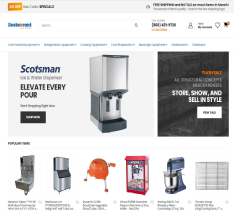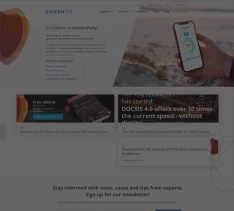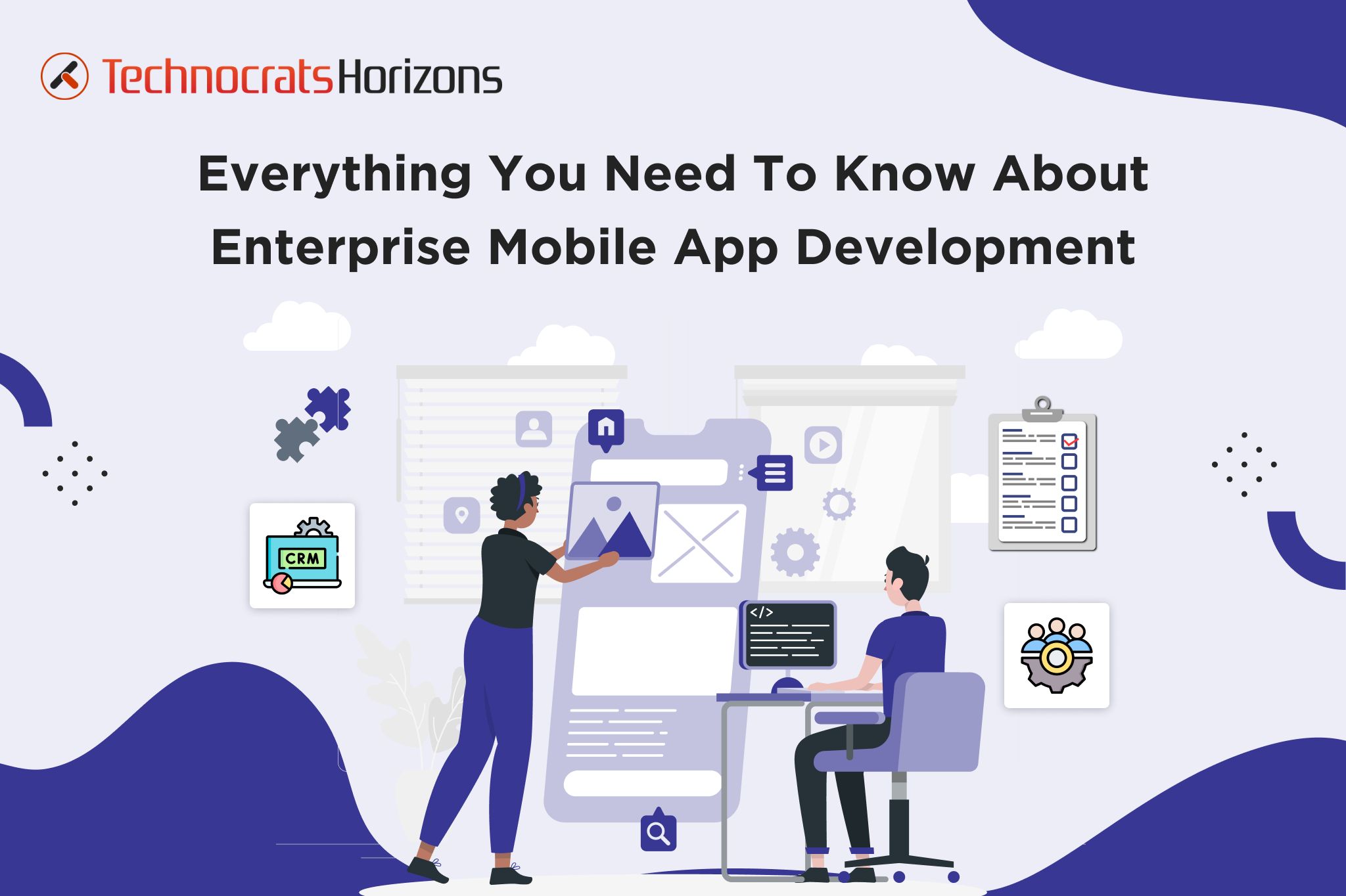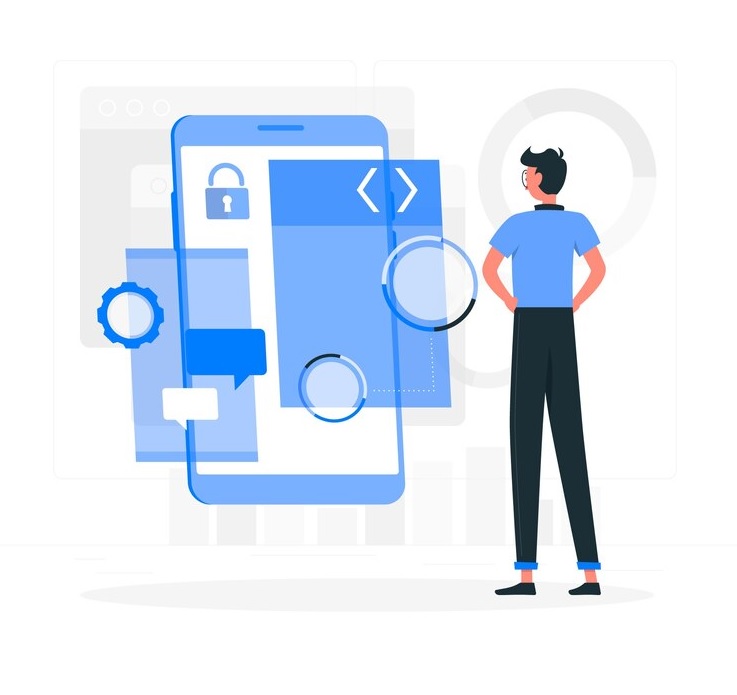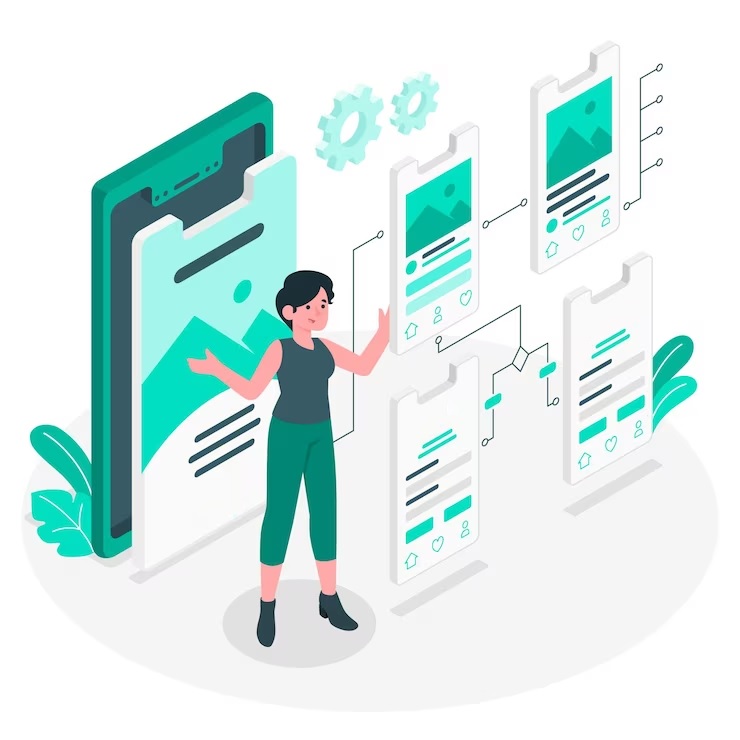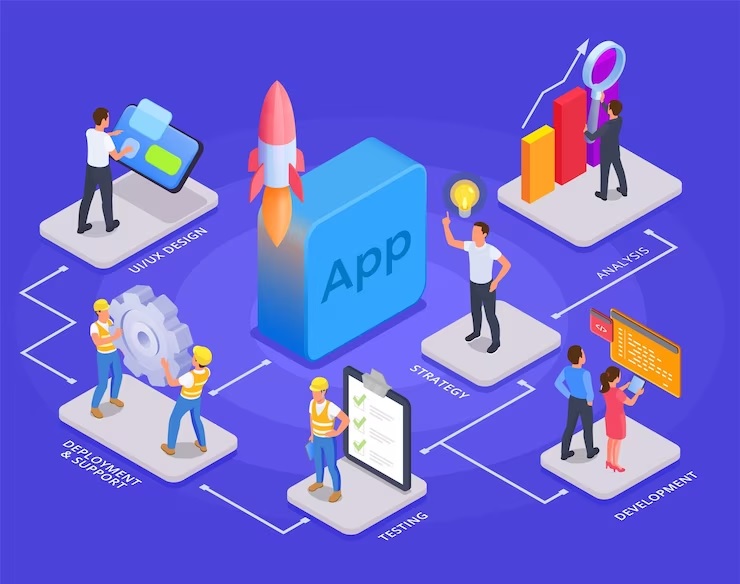What matters the most for a business- sales, profit, smooth operations, or growth? The answer varies from person to person. However, they are all interrelated to each other in more ways than one.
The thing that ties them together is streamlined processes. How do you make sure that every department in your enterprise is in sync with each other and moving towards the same goal? when every process is streamlined and tracked, it gets easier for other processes to fall into place.
There’s one way that can do it all in the most synchronized way and that is enterprise mobile app development. Mobile app development for enterprises with a large group of people can help them manage processes efficiently, optimize them, and make sure everything is executed smoothly.
In this blog post, we will discuss everything about enterprise mobile application development from its benefits to features to how to develop them, we will cover it all so you can make an educated decision.
What is Enterprise Mobile App Development?
Mobile enterprise application development is the term used to describe the process of creating mobile apps for enterprise-grade businesses.
The goal is to tackle business problems with enterprise mobile app development using the newest mobile technology. The majority of these apps are created to meet your specific business requirements ranging from basic accounting systems to streamlining your business processes.
According to Market Research Future, the enterprise mobile app development market is expected to reach $73.89 billion by 2032, with an impressive CAGR of 25.60%.
Enterprise Apps are well-known for facilitating productive and easy communication which is one of the reasons behind its growth. Salesforce and Microsoft 365 are two of the best enterprise apps that were highlighted for their functionalities and integration capacity. These programs have completely changed the way businesses run.
So for businesses who seek great operational efficiency, investing in enterprise mobile app development is the best decision.
Types of Enterprise Mobile Applications
Multiple types of mobile apps are built to serve various purposes of an enterprise. They can be broken down into two major parameters- scale and specific operations. We have given a few mostly used types of enterprise mobile app development so you can understand them better:
Employee Level Apps
These apps are often straightforward and have a limited feature set that is sufficient for internal use only. For instance, it may be an internal communication or data exchange system for team members to communicate with one another or a project management application for managers to track developments.
Departmental Level Apps
These mobile apps aim to increase efficiency in specific divisions of a company. For example, integrating a cutting-edge accounts management system via a mobile app can improve the effectiveness of the accounts department by allowing them to manage transactions digitally and use data to build effective reports that lay the foundation for future planning.
Enterprise – Level Mobile Application
And lastly, some apps are used by the entire enterprise. Every department is integrated into a single, secure network, providing all users with access to the required data. For custom operations, multiple user roles and access levels can be implemented.
An excellent example of such an application is an enterprise resource planning system (ERP), which allows performance data from the inter-connected departments to be displayed in detailed dashboards, simplifying the analytics and decision-making process.
Human Resource Management Apps
Human resources is one of the busiest departments in an enterprise. Enterprise mobile app development with HRM systems can make it easier to simply the meticulous and long hiring process.
With features such as resume screening, interview planner, performance evaluation, and reward management, this type of mobile app can enhance employee evaluations and expedite the hiring process.
Customer Relationship Management Apps
How engaged your customers are with your business becomes one of the biggest deciding factors for your success.
Enterprise mobile app development for CRM helps in tracking consumer behavior and buying patterns so you can create better customer engagement by sending personalized recommendations and responding to their concerns promptly.
Benefits of Enterprise Mobile App Development
It is one of the most beneficial modern tools for businesses to stay ahead of the competition. Although mobile app development for enterprises may seem like a daunting task, the benefits it offers completely overshadow the hassles, which are generally very low. Let’s have a look at some of the benefits:
Organized Planning and Reporting
An enterprise is a large organization and is mostly expanding which necessitates the need for better planning, data management, and insights.
Enterprise mobile app development fulfills all these needs by using this data for planning your next business moves and calculating performance. This provides you with better insights and an outlook on how your business is performing.
Looking to Hire Skilled Mobile App Developer for your business?
High Efficiency
Enterprise mobile app development is powered by multiple advanced technologies like artificial intelligence, reporting tools, and predictive analysis.
This can help your business greatly in reducing development and operational costs, minimizing errors, and optimizing manual operations which boosts your efficiency immensely.
Monitoring Employee Activity
You can monitor your employees’ activity using the app, no matter what they do. Through the app, your employees can report their tasks and their completion.
They can also take their tasks wherever they go and work outside of physical premises which also helps in building and managing external teams.
Cutting Down the Paperwork
In this day and age where most data is digital, using heavy files and cumbersome spreadsheets will hinder your daily operations.
Using an enterprise app can allow you to significantly reduce the number of paper documents that are being shared around your company.
Supply chain optimization
Enterprise mobile application development gives you complete control over the supply chain, which puts all the information you need for planning, delivering, and managing transportation at your fingertips.
Want to Hire Dedicated App Developer ?
Must-Have Features of Enterprise Mobile Applications
Enterprise mobile apps must include a few features that are necessary and should not be overlooked. Among the most popular features that enterprise apps must have are given here:
Internet of Things (IoT) Integration
The need for enterprise mobile apps that communicate with linked devices has surged due to the growing popularity of IoT devices. Thanks to IoT connectivity, businesses can monitor and manage a variety of processes remotely, which increases productivity and lowers costs.
Real-time Connectivity and Analytics
To be successful, every application must possess scientific psychology, or cognitive analytical, skills. Businesses nowadays have to manage hundreds of partners in real-time, as well as multiple processes and operations at remote places.
Apps can access relevant data continuously thanks to real-time connectivity. Real-time data collection and interpretation can make an app a capable enterprise tool that can assist in handling diverse processes and stakeholders effectively.
Offline mode
In the current scenario, this is one of the vital components that an app cannot exist without. Develop and plan a business application that can support offline functionality or operate in offline mode to withstand the intense competition.
This feature allows users to still access the application’s core functions even in the absence of a network, and thus, they are not discouraged by a poor internet connection. This helps you gain both user loyalty and a competitive and strategic advantage.
Security
Since even the smallest data leak can result in a multitude of issues, security is prioritized by the majority of companies and enterprises. Thus, you need to include data encryption, role management, two-factor authentication, and other robust security measures for enterprise mobile app development.
Push Notifications
An enterprise has a large number of employees and sometimes processes that require inter-department communication become too long.
Enterprise mobile app development needs push notifications and alerts which can help employees act on their tasks and requirements quickly. This results in faster processes and high customer satisfaction.
Effortless Data Sharing
Data is one of the most crucial components of any business, from small businesses to enterprises. Your enterprise mobile app development strategy should keep it as a top priority so real-time data/media sharing becomes hassle-free.
It should also make sure that the right data is available to the right stakeholders by including permissions and restrictions.
Third-Party Integrations
Although any functionality can be built through enterprise mobile application development services, creating a custom solution for each feature takes time and money. Therefore, you should integrate third-party solutions to boost productivity and reduce development costs and time.
Stages of Enterprise Mobile App Development
The process of building an enterprise mobile application can be difficult and time-consuming. However, if done correctly, you can have a successful product. Additionally, your journey will go a lot more smoothly if you’re working following the right process:
Stage 1 – Research and Planning
Like any other process, enterprise mobile app development begins with an idea. Therefore, you must first create an outline for the mobile application that aligns with the objectives and needs of your company.
Take into account the issues that your target audience is facing as well as how your software could be able to assist them.
Preliminary research is always required to establish the conceptual framework for any development venture. The goals of the project, its scope, and its main features are decided at this stage only.
Then, you can take a poll of potential users to hear about their experiences and to learn about the demands and requirements of corporate employees who will use the app in their daily work.
Stage 2 – Choose your Enterprise Mobile App Development Platform
The next step is to determine which of the two widely used options—iOS or Android—is the best enterprise mobile app development platform for you. The answer to the question is to understand your target audience’s preferences.
Stage 3 – Build a Team
Hiring a professional enterprise mobile application development team is the next step in this process. Before you start the development process, you need to put together a capable development team that can help you get a successful result.
A project manager, a software developer, a UI/UX professional, and a QA engineer make up the minimum team you might need for enterprise mobile app development. The size of the team might increase depending on your requirements.
Stage 4 – Wireframe and UI/UX
To make sure you are going in the right direction, you need a prototype of the finished product. It displays the typography, and UI elements, including element sizes, spacing, and color palette.
This is where the enterprise mobile app development starts to take shape visually. Since user experience (UX) is crucial to the success or failure of the app, every component is examined for user-friendliness and overall appeal.
Stage 5 – Development
At this stage, your app’s design is put into the development stage. Mobile apps have three components- application programming interfaces (API), a frontend, and a backend.
What people view and interact with on your app is known as the front end. The server side, or backend, is in charge of the internal workings and is inaccessible to users. Through APIs, these two components communicate with one another.
Enterprise mobile app development uses languages like Swift, Java, Flutter, and React Native to build apps for iOS and Android platforms. Throughout the entire code development process, your app undergoes several changes till the desired result is produced.
Stage 6 – Testing
The final stage of development is testing your product, therefore now is the moment to proceed with extra caution and ensure that your company’s mobile application runs smoothly.
This is because a single issue with your app could have a big impact on its functionality and, eventually, the growth of your company. Therefore, be sure to test your application fully.
Stage 7 – Support And Further Enhancement
Even after the app has been available for purchase and users have become accustomed to it, the process doesn’t stop.
Technically speaking, everything must be checked to make sure the servers can handle the traffic and that bugs are fixed immediately.
At the same time, you must also consider scalability. You’ll get user feedback when people download and use the new app, and you can utilize that information to improve the application.
Additionally, you’ll undoubtedly want to add new features eventually, which requires regular support and maintenance and in some cases, repurposing the app.
Tips To Consider for Enterprise Mobile App Development
You cannot just jump into the development process without considering all surrounding elements as it could lead to undesirable results. Here are some tips to give direction to your app development efforts:
Understanding Client Requirements
No set solution could work for everybody. Mobile app development for enterprises requires high customization since each business has different needs and problems they face. Therefore, it’s crucial to understand what are the exact requirements of your client to avoid future clashes.
Estimate Your Budget
After planning your app’s concept, enterprise mobile app development platforms, and features, you need to decide your budget.
For this, you could perform market research and find out how much mobile app development for enterprise costs. This will help you break down the costs and make a clear budget for your enterprise mobile app development.
Define User Roles
Controlling each user’s access requires a robust permission system. In enterprise mobile app development, permission control may be more intricate. In some cases, granting individual access could be the wisest course of action to ensure high security.
Include Cloud Hosting
The best way to improve an enterprise app’s capacity for data storage is to use cloud technologies. It is essential for guaranteeing security. To reduce costs and build confidence, you can only opt for cloud hosting if the app is completely safe.
Cross-platform compatibility
Enterprise mobile app development requires cross-platform modifications, regardless of the device and platform. Most users would find the app useless if their staff couldn’t access it on different platforms and/or devices.
Plan for Scalability
An enterprise does not have a set amount of employees. New employees keep on joining in while the older might leave. It is essential to keep this in mind during enterprise mobile app development and leave room for scaling up or down depending on users. It should be easily adaptable across devices.
Let's discuss costs and stages
How Much Does It Cost to Build Enterprise Mobile Applications?
There’s no specific answer to this question. Each enterprise differs in size and has different expectations from enterprise mobile app development. It also depends upon the customization level, complexity, scale, chosen features, and budget of the app you want to develop.
But there’s a simple formula that can help you calculate enterprise mobile app development costs, here it is:
Enterprise Mobile App Development Total Cost = Development Time x Cost Per Hour
You can save a ton of money and avoid purchasing expensive features that you never use if you carefully consider what you truly need from an app before hiring a development team.
Even for development teams, you have two options, either hire an internal team or outsource enterprise mobile app development.
You don’t need to create a whole new internal IT department if you require an app because there are several reputable enterprise mobile application development companies out there. For this purpose, outsourcing is the most effective method.
Different countries have different development rates, so choose the one that fits your criteria, budget, and time zone the most.
How Long Does It Take To Build An Enterprise Application?
Just like the cost of enterprise mobile application development, the time it takes to build the app also depends upon the complexity, features, and scale of the app. While a simple app might take just a few weeks to build, a complex app of a large scale may take around 6-8 months.
When you follow the agile approach, you can break down the development process into small modules like research, wireframe, UI/UX design, development, and testing.
This helps keep the development on track in case there are any bottlenecks, they are resolved at the concerned stage only and do not hamper the entire process.
Other factors also could influence the time taken for mobile app development for enterprises such as availability of resources, skillset of developers, and quality testing at every stage. It is always a great idea to plan and arrange everything beforehand to avoid unnecessary delays.
Conclusion
Every modern business must understand how crucial it is to become more effective and get ahead of competitors. We discovered in this blog post, how enterprise mobile app development can help you in achieving that. But for this, you need to find an experienced and reliable enterprise mobile application development partner.
We can become that trustworthy partner for you and we are not just saying that without any real credentials.
Technocrats Horizons has 12 years of experience in scalable mobile app development for enterprises and our services have helped multiple clients streamline their businesses.
So if you have made that decision and want to move to the next stage, then reach out to our experts for exceptional enterprise mobile app development services.
Frequently Asked Questions (FAQ)
Why do enterprise mobile apps need QA services?
Enterprise mobile app development generally happens on a large scale and the larger the projects, the more the chances of errors. A quality analyst can help you identify all the bugs so the development team can fix those issues before the app is deployed.
A quality analyst ensures that all the project requirements are met, the app works properly, and there are no costly errors. This helps in boosting user satisfaction and minimizing downtime.
What is the future of enterprise mobile app development?
Technology is constantly evolving and it is crucial to keep up with it. The future of enterprise mobile app development holds great promise with innovations that are going to become part of regular app development.
Technologies such as artificial intelligence, machine learning, predictive analysis, and augmented/virtual reality are going to take over. These technologies will result in a better user experience, robust security, and highly functional apps.
We turn ideas into successful apps!
Let us guide you through the custom mobile app development journey and how your idea can be turned into something successful.


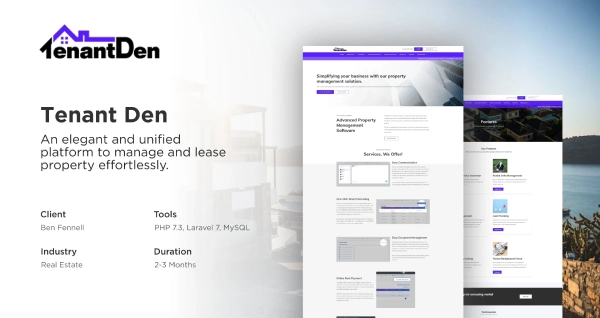

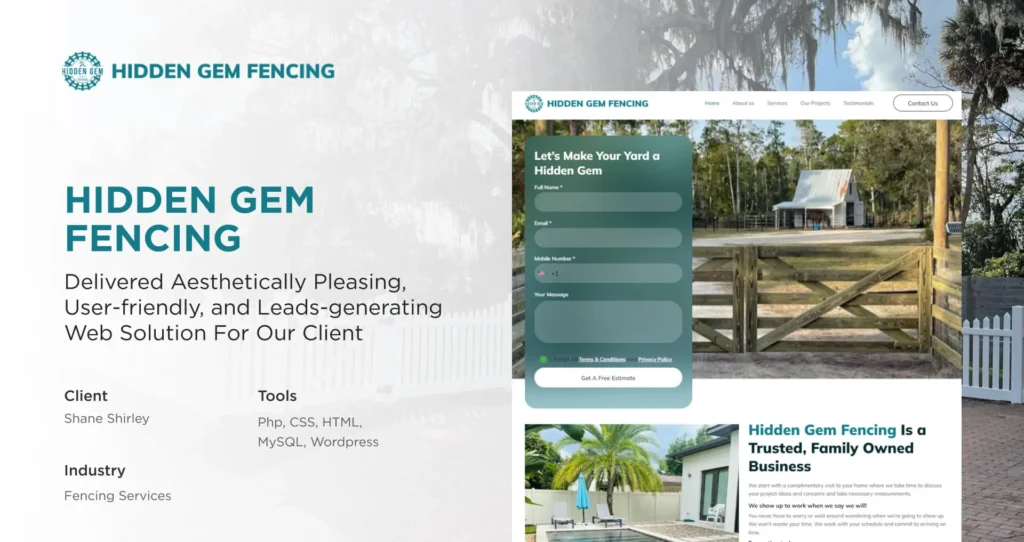





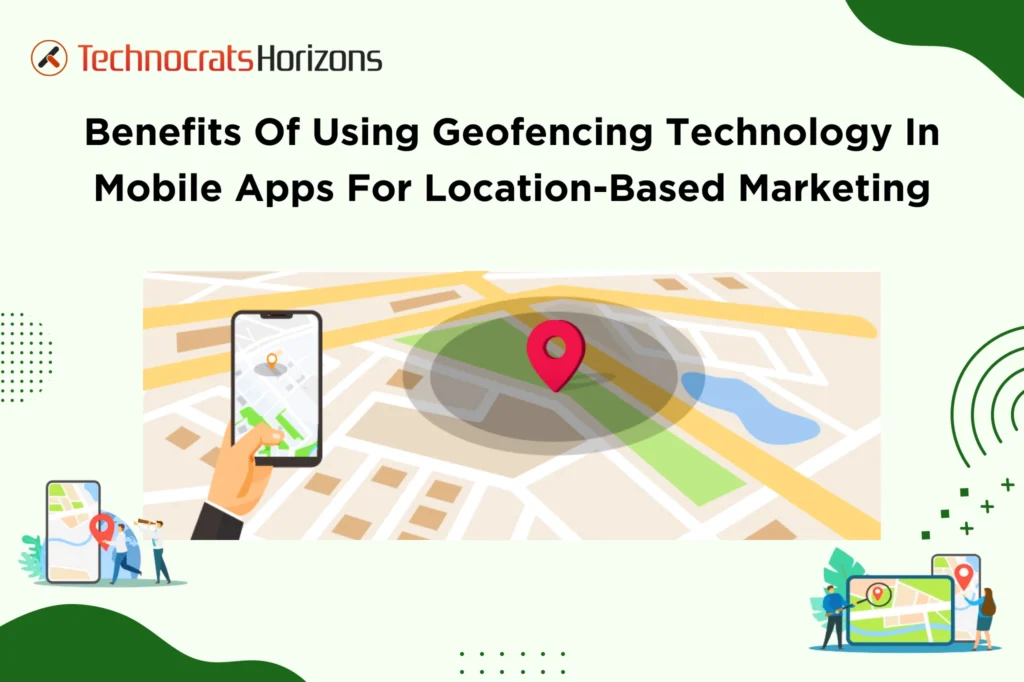
 Request a
Request a












